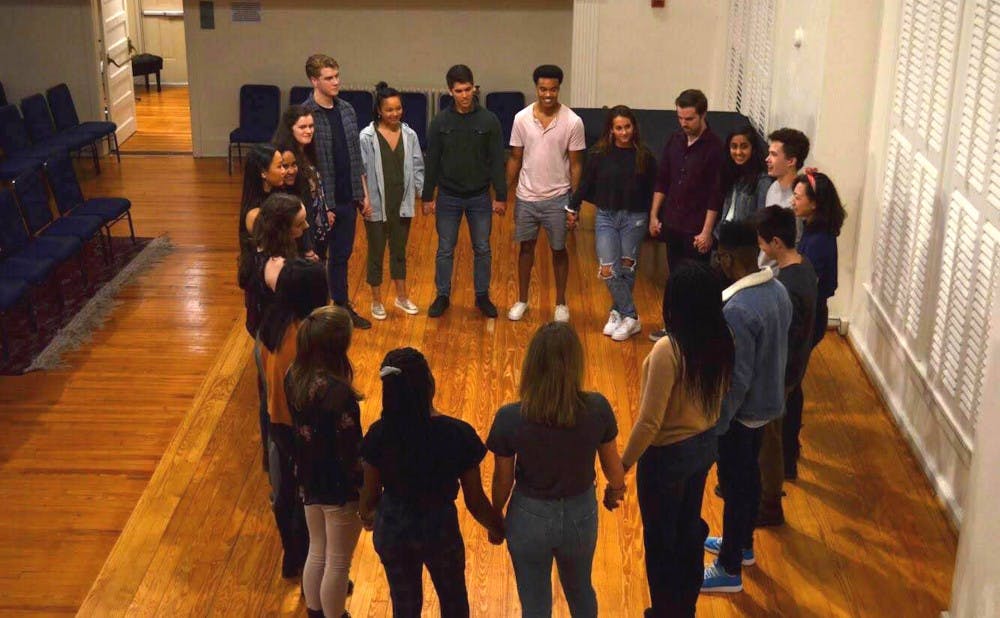Content warning: This story contains mentions of sexual assault.
Note from the show’s directors: Duke's production of the Me Too Monologues has “no direct affiliation with the Me Too Movement, as we remained the Me Too Monologues before the movement came to be. Though such themes may be touched upon in the show, our show relates to identity as a whole, as it relates to the shared Duke experience.”
Duke’s 13th annual showing of Me Too Monologues premiered in the Nelson Music Room on Thursday.
The monologues were written and submitted anonymously by members of the Duke community and performed by student actors. The show’s 15 pieces embraced a variety of topics and tones, ranging from light-hearted stories about summer flings to accounts of sexual assault and abuse.
Senior and MTM co-director Isabelle Adler, whose own monologue was performed last year, hopes that the show “sparks those conversations that aren’t being had otherwise.” Her co-director, junior Benjamin Chipman, also had prior experience with MTM as an actor.
Adler said that she thinks MTM provides a vital safe space for students to express themselves within a college environment that often avoids difficult conversations.
“Everyone thinks that a ‘normal’ Duke student is white, upper-middle class, hasn’t experienced a lot of strife in life, when in reality, maybe some people come into college that way … but by the time they’re a sophomore, a junior, a senior, maybe they've had an experience that was hard,” Adler said. “And where do they get the space to talk about that if they’ve always surrounded themselves with people who fit the ‘effortless perfection’ model?”
Senior Madeleine Yancy, an actress in the show, felt compelled to portray a fellow student’s story after first seeing an MTM performance her sophomore year. She described the sense of resonance she first felt upon hearing a piece that hit home. “It really felt validating to see my own story portrayed by someone, and so I thought that was an amazing thing to do for someone,” she said.
Yancy performed “Eli,” a piece that revolved around grief following the tragic loss of the narrator’s closest childhood friend. “To put myself in that emotion, and to also take on that burden for them, I think is really challenging [because] I want to do it justice for them,” she said after the show. “Whoever wrote that piece entrusted me with those feelings, and that’s a really humbling thing.”
Gus Gress, a first-year who performed “An Open Letter to my Rapist,” also took the role of portraying another student’s lived experience seriously. Gress described the three-month process of preparing for the show as both artistically challenging and deeply rewarding.
Gress said that the show inspires “a change in perspective, an affirmation of humanity” in its viewers. “No matter who you are on Duke’s campus, you go in to see the show and there’s going to be at least one thing said in one of these monologues that really hits for you.” Gress added that being able to hear other students’ stories, even anonymously, “changes how you move through the world,” both within and outside the context of Duke.
First-year Abby Finkle, whose first experience of the Me Too Monologues was on opening night, felt that the show “sent [the audience] through an emotional journey.”
“It honestly made me so proud to be a Duke student,” Finkle said. “I have so much respect for everyone who … had the bravery to write these pieces; for the actors, who were incredible; and the fact that this student organization exists, just to get people’s stories out and help people feel less alone.”
The Me Too Monologues will be shown two more times: Thursday, Feb. 17 at 7 p.m., and Sunday, Feb. 20 at 7 p.m.
Get The Chronicle straight to your inbox
Signup for our weekly newsletter. Cancel at any time.

Sevana Wenn is a Trinity sophomore and features managing editor of The Chronicle's 118th volume.

